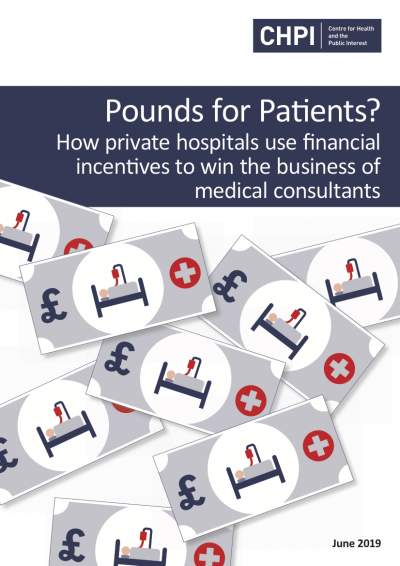Pounds for patients? How private hospitals use financial incentives to win the business of medical consultants
This report has been compiled between May 2018 and May 2019 using publicly available data on the websites of private hospitals, NHS Trusts and Companies House. It finds the following:
Large numbers of NHS consultants own shares or equipment in private hospitals
- Over 600 medical consultants own shares or equipment in the private hospitals where they work and to which they refer patients. The majority of those who own shares work in the NHS. Most consultants with shares own them in the US healthcare company HCA Healthcare.
- The consultants who own shares and equipment in the private hospitals also carry out work in them and receive a fee for doing so. In some cases, the consultants receive a fee each time their equipment is used. This is a very small proportion of the total number of medical consultants.
- The consultant specialties with the largest number of shares or equipment are in oncology (cancer care) orthopaedics (hip and knee replacements) and ophthalmology (eye care).
Share ownership is linked to the harmful over treatment of patients and is a patient safety risk
- Research shows that where consultants own shares or equipment in hospitals patients often receive more treatment than is necessary due to the financial incentives to over treat.
- The breast surgeon Ian Paterson carried out unnecessary cancer surgery on 750 women and deliberately harmed them in order to benefit financially. The existence of these financial incentives is therefore a major patient safety risk.
NHS Trusts have spent £millions to treat NHS patients in the private hospitals where their consultants own shares.
- In total £40 million has been spent by NHS Trusts in private hospitals where their consultants own shares. For example, Sheffield Teaching Hospital NHS Foundation Trust has made payments to Claremont Private Hospital worth £16.7m for orthopaedic patients. 11 of the Orthopaedic consultants at the Trust own shares in Claremont Private Hospital which is 38% of the total number of orthopaedic consultants who work at the Trust.
Very few NHS consultants have publicly declared the fact that they own shares in private hospitals
- Out of 265 NHS consultants who own shares or equipment and work in the NHS only 19 have declared these interests publicly. This is in breach of NHS England guidance on Conflicts of Interest.
NHS consultants and 3 NHS Trusts are involved in joint ventures with the US Healthcare company HCA Healthcare to provide private cancer services.
- 3 of the NHS’ biggest cancer Trusts are engaged in joint venture arrangements with the largest US Healthcare company HCA Healthcare to provide private cancer services. In one case The Christie NHS Trust owns shares in the private patient unit as do 20% of the oncologists who work at the Trust. These consultants also work in the private unit and receive a fee for doing so. The profits from the private cancer unit are shared between the Christie, HCA Healthcare and the consultants who work there.
- In 2 other cases (UCLH and Guys) some of the cancer consultants who work at the Trust also jointly own shares with HCA Healthcare in the Trust’s private cancer unit. None of these arrangements are fully declared by the NHS Trusts.
Private Hospitals have spent £1.5 million in corporate hospitality to win the business of consultants
- In order to encourage consultants to refer patients to their hospitals some private hospitals have provided them with lavish hospitality. This includes individual trips to cricket and Wimbledon matches worth over £1000, Golf tournaments, dinners, Christmas hampers and comedy nights.
- One company in particular, Spire Healthcare, has spent £1 million over two years on gifts and hospitality. NHS England guidance prohibits NHS consultants from receiving more than £75 worth of corporate hospitality. It is unclear whether the nature of this corporate hospitality would breach the Bribery Act 2010.
Pounds for patients? How private hospitals use financial incentives to win the business of medical consultants
Support Our Work
CHPI is the only truly independent health think-tank dedicated to the founding principles of the NHS. To continue our work keeping the public interest at the centre of health and social care policy, we need your help.
Please support CHPI so we can continue to impact the health policy debate.

